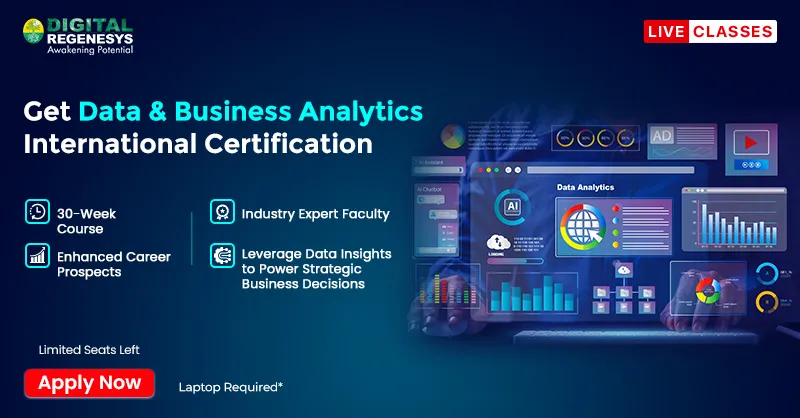Can AI Replace a Data Analyst?

Can AI replace a data analyst? This question gets asked by many professionals. The short answer to this would be ‘no’ – not entirely.
AI will indeed change the role by automating routine tasks and speeding up the analysis process. But AI requires human insight, context, and ethical judgment. Analysts who learn to work with AI will be more valuable, not less.
This article explains how AI reshapes jobs and which tasks are likely to be automated, while pointing out the need to sharpen analysts’ skills. It also shows how Digital Regenesys prepares learners for an AI-assisted data career.
To understand this transition clearly, let’s look at this article to know how AI is influencing the data analysis profession and what it means for future careers.
How AI is Going to Change the Role of a Data Analyst?
AI already automates parts of the analytics workflow, which affects tools, daily activities, and job responsibilities. As organisations adopt more advanced systems, the responsibilities of analysts expand beyond technical tasks and increasingly move towards strategic thinking.
In the sections below, we explain what the major shifts are and what they mean for working analysts.
1. Automation of routine tasks
AI is great for performing repetitive, clearly defined tasks such as cleaning data, simple aggregation, and creating routine charts. By taking on these tasks, AI quickens delivery and decreases human mistakes.
Analysts will spend less time on manual preparation and more on interpreting results.This increases the expectation for quicker turnaround and higher-value analyses showing strategic impact rather than simple reporting.
2. Augmentation of analytical capabilities
Rather than replacing judgment, AI often acts as an assistant to find patterns and suggest models.It can surface correlations and irregularities that would take humans far longer to spot.
Well-trained analysts use these AI outputs to form hypotheses, test scenarios, and produce recommendations.In this way, AI amplifies an analyst’s capacity to deliver deeper insights and more precise forecasting.
3. Shifting focus to human skills
As machines carry out the technical repetition, human skills grow in importance: data storytelling, critical thinking, domain knowledge, and communication with a wide array of stakeholders.
Analysts must interpret the outputs of models into business action and walk decision-makers through trade-offs. In the future, employers will seek people who can harness analytics rigour by applying business sense to guide decision-makers with clear evidence.
4. Greater need for accountability and ethics
AI systems can be biased, opaque, or otherwise misapplied. Human judgment helps validate results, verify the provenance of input data, and interpret model limitations. Analysts will audit outputs for compliance, ethical concerns, and other issues.
This is a task requiring a great deal of caution, domain expertise, and clarity about how models are trained and what they actually mean.

Will AI Take Over the Data Analysis Role? Practical Limits of Automation
AI tools are powerful, but they have limits – they require clean data, well-defined objectives, and human context.Human analysts will still be necessary in places where problems are unclear, incomplete, or ethically sensitive.In many settings, the role evolves: analysts are now curators of AI, designers of experiments, and interpreters of nuanced results. In that future, the role becomes more strategic, not obsolete.
Below are a few practical limits that explain why human analysts remain essential:
- AI struggles with unclear problems: When goals are vague or data is incomplete, human reasoning is needed to frame the question and decide what matters.
- Context is still a human skill: AI can detect patterns, but it cannot understand cultural, behavioural, or business context behind the numbers.
- Ethical risks require human oversight: Bias, fairness, privacy concerns, and compliance issues need careful evaluation by trained professionals.
- Strategic decision-making remains human-led: Analysts guide how AI findings should be applied, ensuring recommendations align with organisational realities.
- AI cannot replace creativity or experimentation: Designing tests, refining hypotheses, and exploring new approaches rely heavily on human insight.
Read More: What Are the Essential Skills for Data & Business Analytics Professionals?
How Data Analysts Can Adapt?
The analytics profession is evolving, and those who build the right mix of technical understanding and human-centred judgement will remain valuable. AI may automate certain tasks, but it cannot replace the strategic reasoning analysts bring to the table.
The following steps show one way to stay relevant and career-ready.
1. Embrace AI as a partner
Accept AI tools as helpers, not threats.Learn how popular automation tools and model pipelines work. The knowledge will let you validate the output, tune parameters, and integrate AI suggestions into business analyses. When you can quickly assess AI results and add domain insight, you become the bridge between models and decisions.
2. Focus on changing skills
Develop skills that are hard for machines to master, i.e. critical thinking, problem formulation, causal reasoning, and storytelling.Improve your presentation and stakeholder management.Learn to ask the right questions so the AI produces useful answers.The above-mentioned human strengths will make you vital despite the automation of technical tasks.
3. Gain technical fluency
Not every analyst has to be a data scientist, but basic coding, SQL fluency, and familiarity with model outputs help.Learn how models are trained, what common metrics mean, and how pipelines are deployed. It allows working jointly with data engineers and to critique automated results effectively.
4. Build domain expertise
Deep knowledge of your industry, whether that’s finance, health care, or retail, provides a context that models simply can’t match. Domain expertise helps you to select relevant features, recognise implausible results, and recommend practical action. Among analysts, those who can blend sector knowledge with AI literacy are in exceptionally high demand by employers.
5. Practice continuous learning
AI is moving quickly. Refresh your skills regularly, stay updated with best practices, and experiment with new tools.Practical learning, such as projects and case studies, develops judgment more quickly than pure theory. More structured courses help accelerate progress, with certification of capability.
Read More: Why Is Data Literacy Essential for Success in the Digital Age?

The Employer’s View: AI Impact on Data Analyst Jobs
Organisations also welcome AI, as doing so reduces routine costs and improves speed. However, they still hire analysts capable of producing insight in managing models and communicating outcomes. Thus, employers would expect analysts to guide AI systems, ensure data quality, and translate results into action.
Key employer expectations include:
- Quality Assurance Oversight: Analysts are expected to audit AI results, check data accuracy, and identify inconsistencies before insights are shared.
- Clear Interpretation of Insights: Employers want analysts who can explain AI-generated findings in simple terms for operational and leadership teams.
- Experiment and Model Design: Professionals must know how to frame problems, choose appropriate tools, and set up reliable tests for decision-making.
- Strong Business Understanding: Analysts who combine industry knowledge with AI literacy bring context that automated systems cannot replicate.
Future of Data Analysts in an AI era
In an AI era, the future of the data analyst is collaborative. The analysts leading the way will be those who are refining their human skills along with their knowledge of the various tools.
Roles may be split into a specialism in model engineering, others in business analytics, and some in storytelling. The job titles will change, but for skilled, curious professionals capable of interpreting complex outputs, demand will remain strong.
Expected developments in the profession include:
- Growth of Hybrid Roles: More roles will combine analytics, automation oversight, and communication duties as AI becomes part of daily workflows.
- Greater Focus on Model Interpretation: Analysts will be needed to interpret complex outputs, highlight risks, and guide decisions informed by AI tools.
- Expansion of Ethical and Governance Tasks: New responsibilities will emerge around monitoring fairness, checking for bias, and ensuring responsible model use.
- Higher Demand for Insight Storytelling: Analysts who can turn technical results into meaningful business guidance will stand out in future hiring.
How Digital Regenesys helps you prepare
Digital Regenesys offers a Certification Course in Data and Business Analytics to provide both technical grounding and business context. This is a programme that covers core analytics, visualisation, and practical use of modern tools. It also put stress on problem framing, communication of results, and ethical handling of data. This mix prepares learners to work with AI while preserving the human skills that employers value.
Taking a structured course shortens the learning curve and develops the judgment that AI cannot provide.The practical projects and real-world examples build confidence and give you a portfolio to show to employers.
For more information, read this – Where to Study Business Analytics? Explore its Importance, Skills, and Courses!

Conclusion
So, if still asked, “Can AI replace a data analyst?” The answer will remain the same, i.e. not completely. Automation of routine work and boosts analytical reach are accomplished, but human skills remain essential: judgment, domain knowledge, ethical oversight, and storytelling. The more adaptive analyst will be more valuable in an AI-assisted workplace.
Upskill both your technical and human skills with the Data & Business Analytics course at Digital Regenesys.
Enrol now and understand how to use AI tools, develop a business mindset, and stay competitive in a changing data landscape.
Last Updated: 5 February 2026